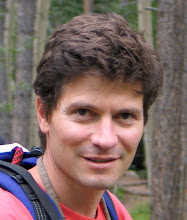There is a lot of hoopla right now in the evolution and creation camps over the movie, Expelled. This is a case where Hollywood could make a comparatively low-budget movie and potentially capitalize on the volatile Creation-Evolution controversy. Wikipedia says that the movie had a budget of $3.5 million and Yahoo! movies shows that it has grossed $5.3 million so far. Wikipedia and expelledexposed.com both cite the many scientific inaccuracies and deceitful nature of the interviews presented in the movie, which are the subject of most of the blog postings. This post is a bit different.
I am an advocate of ID in schools, not as science, but as a religion or philosophy course. Now, as Dr. Francisco Ayala notes, "We don't teach alchemy along with chemistry. We don't teach witchcraft along with medicine. We don't teach astrology with astronomy." Why do I say that ID should be discussed (notice I did not say "taught") in schools? Because it is the culture of most students. (See also Where there's smoke).
To ignore that culture is irresponsible and disrespectful. It makes scientific teaching pompous and preachy. Scientists frequently say that this has nothing to do with religion and that all they are doing is presenting the data. This "just the facts, ma'am" teaching of science is where we are failing to teach students what science is really about.
Science should be presented as what we know and how we know it, and even more crucially, how can we build a hypothesis, test it, and analyze the results accurately. I'm sure this is the objective of every science teacher. But what drives this hypothesis building? Curiosity. How can that be fostered?
In every scientific journal article, there is a Discussion section that repeats the objectives of the study with a summarization of the results. These new conclusions are placed in historical context and offer perspectives, interpretations, implications, and areas for more inquiry. It is in the Discussion section where active readers can agree or disagree with the report, but either way, more questions can be asked. In this way, Science perpetuates Science. Get rid of the Discussion section and you lose the relevance of the study and kill inquiry.
When science becomes just about presenting the facts, it becomes taxonomic. (This type of presentation, ironically, is the science that I was taught in a Christian, young earth creationism classroom where I was presented biology without evolution).
Science should be taught with that Discussion section -- that it has the ability to cure disease, elucidate behavior, explain the stars, and challenge philosophies. Maintaining a fear that ID in a philosophy course will be a toehold for it to creep into the science classroom loses the forest for the trees.
Scientists Expelling Science
Posted by
Tom
6
comments
![]()
Labels: creationism, evolution, Intelligent design, science
Science Debate 2008
There is a coalition, Science debate 2008, that has tried and tried to get US presidential candidates to discuss their views on science. Obama has declined, Clinton has been non-committal, and McCain non-responsive. Meanwhile, Clinton and Obama will attend "The Compassion Forum", a forum of "wide-ranging and probing discussions of policies related to moral issues." CNN will serve as the exclusive broadcaster of the "presidential-candidate forum on faith, values and other current issues" at Messiah College near Harrisburg, Pa., April 13 at 8 p.m. You can read more here.
Is there not more of a moral responsibility to pursue disease cures, environmental protections, and methods that promote global wellness? Pretty soon, our prayers will be directed at how the amazing science in Asia can rescue us.
Posted by
Tom
9
comments
![]()




